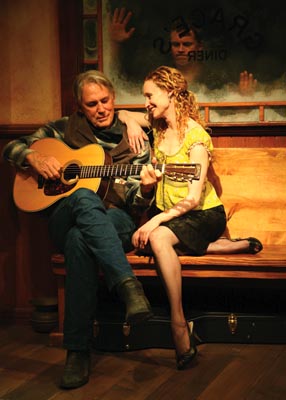Bus Stop by William Inge, presented by Rubicon Theatre Company.
At the Rubicon Theatre, Sunday, February 24. Shows through March 16.

William Inge brought an unexpected tenderness to the American theater of the 1950s. From out of the brawling, bittersweet work of his mentor Tennessee Williams, Inge formed a vision that embraced all the contradictions of American life while always keeping one eye on the shining star of romantic love. In Bus Stop, Inge employs the device of a sudden snowstorm along the highway between Kansas City and Topeka as the occasion for a small group of relative strangers stuck in a roadside diner to explore the limits of life and love. At the center are the lovers, Bo Decker (Jason Chanos) and Cherie (Angela Christian). She’s a nightclub singer from the Ozarks with a shady past. He’s a cowboy from Montana with money in his pocket and a wild spirit. After a night together in Kansas City, Bo has decided to take “Cherry” (that’s the only way he can say her name) back with him to the ranch. As the play opens she has changed her mind, and enlists the local sheriff, Will Masters (Steve Larkin), to halt her abduction.
Grace’s Cafe is the play’s only setting, and it works perfectly as the warm cave in which these people take brief shelter against a hostile climate. Owner Grace, played beautifully by Alison Coutts-Jordan, has seen it all and yet somehow retains her sense of fun and sex drive. Young Elma Duckworth (Lauren Patten) on the other hand, is as naive and innocent as they come, yet her sweetness is grounded in intellect and emotional strength. Rounding out the cast are a creepy alcoholic professor, Dr. Lyman (Leonard Kelly Young), the amorous bus driver Carl (Carl Palmer), and Virgil Blessing (John Bennett Perry), Bo’s sidekick and mentor from the ranch. It is to the credit of the playwright Inge and director Brian McDonald that each of these characters seems entirely believable and unhurried as they go about working out their assorted destinies.
There are some wonderful set pieces, including a hilarious, then pathetic version of the balcony scene from Romeo and Juliet, and a sexy musical number by Cherie that sets the lights over the counter swinging. By the end of the night Bo has been to jail and back, and Cherie has come to see the wisdom of letting things happen as they will. All the action is intensified by the sense of isolation engendered by the storm outside, and through the poetry of Inge’s language, the hearts of these good people and their audience are touched with unsentimental joy.



